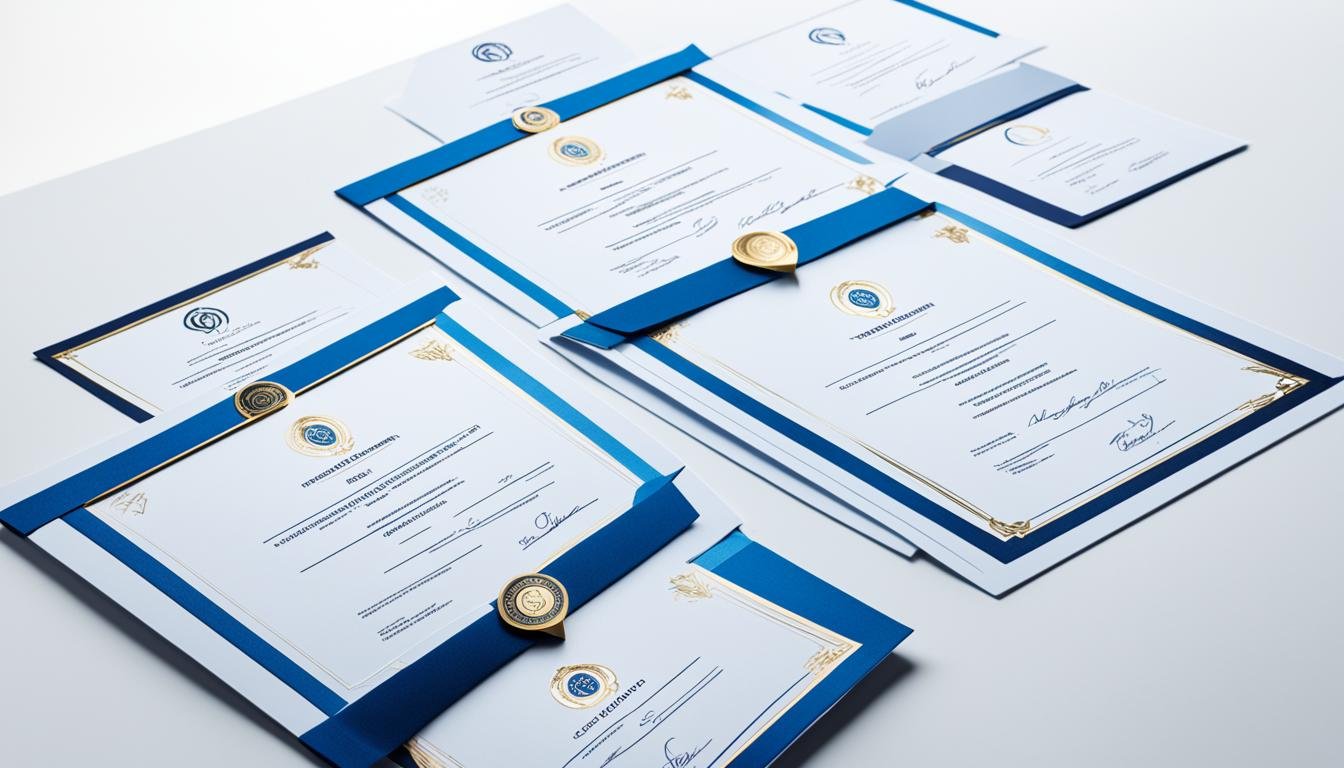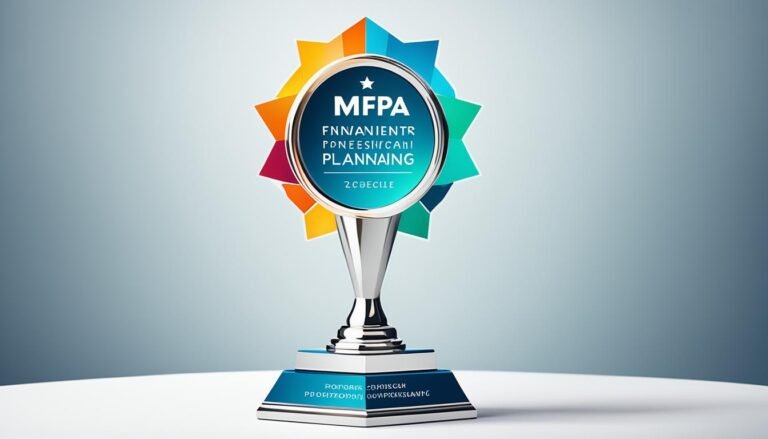Top Chartered Institute of Management Accountants (CIMA) Certifications
Did you know CIMA is the world’s largest and oldest in its field? It has been around for over a hundred years. This shows its deep understanding of management accounting.
The certifications from CIMA are known everywhere and are greatly respected. They are perfect for those who want to do well in management accounting. You will learn how to analyze strategically and plan financially. This knowledge helps you succeed in a changing business world.
Key Takeaways:
- CIMA is the largest and oldest management accounting body worldwide.
- CIMA certifications are globally recognized and highly valued.
- CIMA equips professionals with the skills needed for strategic analysis and financial planning.
- CIMA certifications provide opportunities for career advancement and professional growth.
- CIMA is a trusted institution for management accounting education and development.
What does a management accountant do?
Management accountants help businesses with financial management and smart choices. They look at financial data and use their business know-how to give key insights. These insights are vital for a business’s success.
Their work is more than just the usual accounting. They analyze financial data, create reports, and spot trends for management to consider. They focus on the future, finding places to make the company work better and grow.
They work in many fields, like tracking costs, making budgets, or looking at how well the company is doing. They understand the business’s goals well. So, their financial advice is always strategic and smart.
Thanks to their skill in analyzing finance and planning, they boost the company’s win. They help management make good choices that better the business. This is by studying numbers and giving advice that really works.
“Management accountants are the link between money info and choices. They suggest strategies and help companies reach their targets.” – Jane Smith, Chief Financial Officer
By merging financial smarts with deep business understanding, management accountants are key in making decisions. They suggest real actions based on finance reviews. This helps the company face challenges and grab chances.
The role of a management accountant is crucial for staying ahead in business. With their talent in crunching finance numbers, advising on choices, and looking ahead, they are a big help. They really drive the success of a business.
Responsibilities of a Management Accountant:
- Analyze and interpret financial data
- Prepare financial reports and statements
- Conduct forecasting and budgeting
- Identify cost-saving opportunities
- Assist in strategic planning
- Provide financial insights for decision-making
What sets a management accountant apart from a traditional accountant?
Management accountants are different from traditional accountants in several key ways. Traditional accountants look at past financial data mainly for reports. But management accountants look at both numbers and other info. They use these to suggest decisions.
Management accountants see beyond just the financial numbers. They look at how every part of the business is doing. This helps give advice that’s directly useful for the company’s success.
They focus their work on the company’s big goals. Their advice goes further than just money reports. They deeply understand what the business needs to succeed and grow.
Management accountants mix numbers with understanding to give useful advice. This helps the company spend money wisely, manage costs better, and find new chances to do well.
To sum it up, management accountants look at the whole picture. They consider financial and operation data. This approach lets them offer smart advice. It helps the business achieve its goals and do better overall.
The value management accountants bring to business
Management accountants are key for business success. They know how companies work, which makes them great leaders. They offer a lot in the business world.
They help in coming up with new ideas. Using their know-how, they guide companies to be more inventive. This helps those companies do better in the future. Their skill in studying money and other facts lets them decide well. This helps the company grow and stay strong for a long time.
They are also amazing at guessing what might happen in the future. They watch the market, spot dangers, and guess what might happen next. This skill is big in making smart choices. It helps companies work better, find new places to sell their stuff, and grab new chances.
“Management accountants are valued for their strategic insight, leadership capabilities, and ability to leverage financial and non-financial data for informed decision-making.” – Jane Smith, CFO of XYZ Corporation
Management accountants mix money smarts with a deep business understanding. This lets them offer advice that’s more than just about the dollars. They look at how choices affect the whole company’s performance and future growth.
To wrap up, management accountants do a lot. They lead in business, give new ideas, and help in making good choices by foreseeing what might come. Their knowledge helps companies stay competitive, grow, and win in the long run.
Career paths with CIMA qualifications
CIMA qualifications open many doors in management accounting. Professionals can find jobs in different sectors. They use their skills to help businesses do well. You might aim for roles like CFO, finance manager, or business analyst. CIMA is a great start for a successful career in this area.
1. Chief Financial Officer (CFO)
The CFO leads a company’s financial work and sets its financial goals. With a CIMA certification, you learn how to lead well. You manage risks, decide where to invest money, and set the financial strategy.
2. Finance Manager
Finance managers look after a business’s money matters. This includes making budgets and reports. CIMA teachings help you make smart financial choices and improve the company’s money situation.
3. Management Consultant
Management consultants give advice to help companies do better. A CIMA qualification means better forecasts and financial strategies. You can help businesses improve and handle their money smarter.
4. Management Accountant
Management accountants study financial data to help with decisions. CIMA learning sharpens your financial thinking. You can help a company do better with smart financial advice.
5. Finance Business Partner
Finance business partners work closely with other teams. They help those teams with financial advice to grow the business. CIMA training makes you a financial expert who knows the business well.
6. Financial Accountant
Financial accountants keep the books straight and make sure everything follows the rules. A CIMA qualification hones your financial skills. You become essential for a company’s financial health.
7. Business Analyst
Business analysts look at markets and make suggestions for growth. CIMA and your financial knowledge help those ideas come to life. You play a key role in making good financial choices.
8. Accounts Assistant
Accounts assistants support the finance team with various tasks. This can include handling invoices and helping with financial checks. CIMA studies prepare you well for this role.
CIMA is your key to many roles in management accounting. It gives you the know-how and confidence you need to excel.
How CIMA helps in career development
CIMA gives different ways for people to grow in their careers. It helps them get the skills needed to be great at management accounting.
The CGMA Professional Qualification is a special program made to make people more employable. It teaches both technical stuff and leadership, important skills for companies today.
For those who like to learn and work at the same time, CIMA has an apprenticeship program. This program lets apprentices learn hands-on and study at the same time.
After high school, there’s a way for students to start CIMA right away. It sets young people on a path towards management accounting success from the beginning.
Students in college can also add CIMA to their studies. This makes them more ready for the job market when they graduate.
If you’re already in a related field, like the AAT, you might have a quicker route to a CIMA qualification. CIMA values your previous learning and expertise, making it easier to get certified.
CIMA aims to help everyone at any stage of their career. It focuses on practical skills and useful knowledge for success in management accounting worldwide.
CIMA Career Development Routes
| Career Development Route | Description |
|---|---|
| CGMA Professional Qualification | A comprehensive program focused on employability, providing technical expertise and leadership skills sought by employers. |
| Apprenticeship Program | A unique opportunity to learn and earn simultaneously, combining practical work experience with professional studies. |
| School Leaver Route | An accelerated pathway for school leavers to start their CIMA journey immediately after completing their education. |
| Undergraduate/Graduate Route | Integration of CIMA into university studies, offering a head start in careers by merging academic pursuits with professional qualifications |
| Member of Another Professional Body Route | Fast-track routes for professionals who are members of other accounting bodies or the AAT, recognizing prior learning and expertise. |
About Chartered Institute of Management Accountants (CIMA)
The Chartered Institute of Management Accountants (CIMA) started in 1919. It is the world’s leading and most experienced body for management accountancy. CIMA helps professionals globally with top qualifications and training.
The top title you can earn with CIMA is the Chartered Global Management Accountant (CGMA). This is known everywhere as a top achievement in managing money.
CIMA teaches finance, strategy, making choices, and understanding business deeply. Graduates of CIMA know how to manage money in tough situations and lead to success. This prepares them for high-level jobs.
Being a CIMA member means more support for your career. You can learn from the best in the field, stay current on what’s happening, and meet others in the same profession. You also get advice from seasoned professionals.
Is your goal to be excellent in management accountancy? Then, CIMA, with its long history and universal respect, is the place for you. It is dedicated to helping you become outstanding in your field.
Benefits of CIMA Membership:
- Access to a global network of professionals and experts in the field
- Continuous professional development opportunities to stay up-to-date with industry advancements
- Access to exclusive resources, research, and publications
- Recognition of professional competence and commitment to ethical standards
- Opportunities for career advancement and job prospects worldwide
CIMA Exam and Qualification Process
The CIMA qualification shows how well you know management accounting. You need to pass several tests. The tests cover key topics like financial analysis and strategic planning.
There are three levels of exams: Operational, Management, and Strategic. Each level has different papers. These tests help see if you understand different parts of management accounting as you learn.
This exam system lets you learn more as you go up in levels. You start with simpler topics and move to more complex ones. It helps you become a well-informed professional in management accounting.
The exams will ask you about financial and management accounting. They also cover business taxation and risk management. These topics are important for working in management accounting.
Operational Level
At the Operational level, you’ll learn about basic management accounting. This includes cost accounting and how to measure performance. You’ll also cover business basics.
Management Level
In the Management level tests, you dive into more complex management accounting. You’ll study strategic budgeting and risk management. These tests help you become skilled at making strategic decisions.
Strategic Level
The Strategic level focuses on using your knowledge in real business situations. You’ll learn about strategic planning and finance strategies. These are the toughest exams and are about applying what you know in the real world.
Gaining relevant work experience is also important for the CIMA qualification. Those who pass the exams must also meet a work experience requirement. This helps prepare you for roles in management accounting.
The price of the CIMA exams changes based on the level and number of papers. Candidates should plan out their exams and budget for them.
Earning the CIMA qualification proves your skills in management accounting. It opens doors to many jobs in various fields. So, it’s a good step for your career in accounting.
CIMA Global Recognition and Alliances
CIMA is a well-recognized professional accounting body globally. It is known for its high standards and tough qualifications. Many top international professional bodies and accounting groups have joined hands with CIMA. This brings many benefits to CIMA members and boosts CIMA’s standing worldwide.
Thanks to these partnerships, CIMA members can quickly earn qualifications in other countries. They also open new doors for professional growth across the globe. This shows the power of CIMA’s worldwide recognition.
CIMA members can use their qualifications globally, thanks to these agreements. They also encourage sharing skills and knowledge between CIMA and other leading accounting associations. This builds a strong global community of professionals.
“CIMA’s global recognition allows professionals to enhance their credibility and leverage their qualifications in the global job market.”
International Professional Bodies
CIMA works closely with top international professional groups. Some of these include the:
- Association of Chartered Certified Accountants (ACCA)
- Institute of Chartered Accountants in England and Wales (ICAEW)
- Chartered Institute of Public Finance and Accountancy (CIPFA)
This collaboration helps in the sharing of knowledge and expertise across borders. It also boosts the importance of CIMA qualifications worldwide.
Reciprocal Agreements
CIMA also has reciprocal deals with key accounting groups globally. These agreements increase the value of CIMA qualifications. They include:
- The American Institute of Certified Public Accountants (AICPA)
- The Institute of Management Accountants (IMA)
- CPA Australia
These deals allow CIMA members to earn more qualifications without starting from scratch. This speeds up their professional growth and expands job opportunities.
| Benefits of CIMA Global Recognition and Alliances |
|---|
| Cross-border career opportunities |
| Access to accelerated routes to other professional qualifications |
| International recognition and credibility |
| Exchange of knowledge and expertise |
| Enhanced career prospects and professional growth |
CIMA’s agreements and partnerships show its dedication to a global community of accountants. Through international recognition and collaboration, CIMA boosts the value of its qualifications in today’s global job market.
Benefits of Pursuing a CIMA Certification
Getting a CIMA certification brings many perks. It helps you move up in management accounting. With it, you’re better ready for growth and have more job choices.
1. Career Advancement
A CIMA cert makes you more skilled and knowledgeable for your career journey. It’s a boost in earning promotions or high-level seats. You learn how to make smart financial choices, uplifting any business you are in.
2. Global Recognition and Opportunities
CIMA certs are respected all around the world. This gives you an edge in the global business scene. You’ll find work and exciting projects all over the globe.
3. Strategic Decision-Making Skills
With CIMA, you learn how to handle the big decisions. It deepens your grasp on money matters, forecasting, and handling risks. These talents are key in pushing any company forward and meeting its goals.
4. Continuous Professional Development
CIMA is not just about the start; it’s about growing always. Keeping up with the latest trends in your field is crucial. Being a CIMA pro means you never stop learning, always staying ahead.
“Got a CIMA? You’ve made a smart career move, ready to take on the challenges of management accounting. From promotion paths to recognizing your skills worldwide, CIMA equips you for success in the business hub of today.”
5. Networking and Professional Community
CIMAs lead you to a wide global group of management accounting experts. This provides chances to attend key events and discuss with those sharing your interests. A strong professional network is vital for success and keeping updated with new industry trends.
| Benefits of Pursuing a CIMA Certification | |
|---|---|
| Career Advancement | Strategic Decision-Making Skills |
| Global Recognition and Opportunities | Continuous Professional Development |
| Networking and Professional Community |
Choosing a CIMA route means a brighter future. It means growth in your career, global respect, smart decision-making skills, and endless learning. Being CIMA-ready is being ready for anything in the management accounting world.
Conclusion:
Getting a CIMA certification is a smart step for those aiming high in management accounting. These qualifications give a deep skill set. They let you grow your career and find new job paths.
By earning the CIMA Professional Qualification through exams, you become a skilled management accountant. This title helps you make smart choices that benefit businesses.
CIMA is a key player in the management accounting world. Its certifications are among the best and are known worldwide. The institute is well-regarded for teaching and professional growth.
Employers value CIMA-certified professionals for their expertise in managing finances. This global recognition boosts job opportunities around the world.
If you want better job options, to hone your decision-making, or to be recognized globally, CIMA is for you. Its benefits are many in the fast-evolving field of management accounting.








